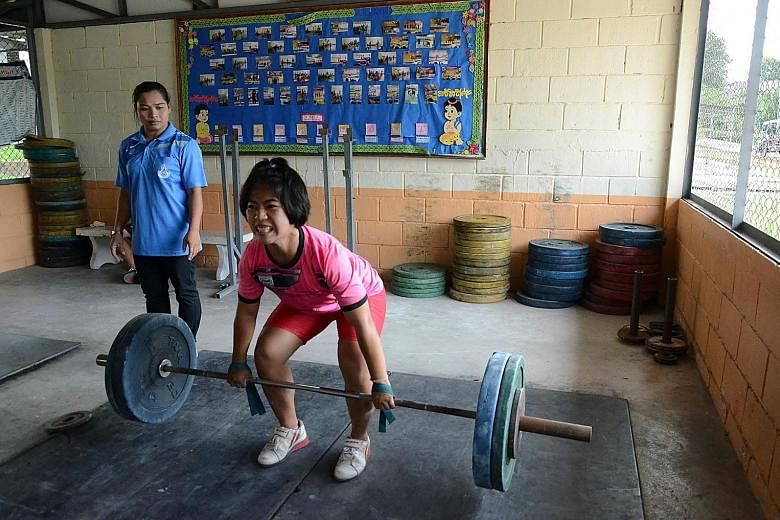Standing firmly in scruffy trainers, 12-year-old Monrudee Meesaeng wraps her fingers carefully around an ageing bar-bell. She heaves it to the height of her shoulder, before jerking it above her head. And then she does it again, and again, with the kind of fortitude more easily found in someone twice her age.
Thailand won six medals at the Rio Olympics, four of them in weightlifting - including two golds, which are the most across any sport among the Asean countries.
The sport in fact has consistently delivered at least one medal at every Olympics since 2000. With an 11-medal haul since Sydney - all but one from women - Thai weightlifters have now overtaken their fellow boxers in the race to the podium.
Their path to the Olympics starts here, in small provincial gyms like this one in Surat Thani where Monrudee spends at least three hours a day training after school. The Suksa Songkro school provides boarding for some of the province's poorest children.
Monrudee's parents are landless rubber tappers. "I want to be strong. I want my parents to be proud of me," she tells The Straits Times. "And I want to help my father and mother."
Fame and glory are secondary in a sport where athletes train for years to perform for about all of 10 seconds. Weightlifting attracts few spectators. Female weightlifters, in particular, have to contend with looking physically out of place in a society more used to the ideal of women as waifs. Yet generations of impoverished Thai women have turned it into their niche, turning the kingdom into a global weightlifting powerhouse.
"Children from wealthy families do not take up this sport," says Pawina Thongsuk, 37, a weightlifting judge who won a gold medal at the 2004 Games in Athens. "All the children who join, dream of a better life for their families. They come early, at a very young age.
"It's good for their training too, because the earlier you come, the better the training can be."
The bar-bell is their route to an iron rice bowl. The two Thai gold medallists at these Games will each be rewarded with 12 million baht (S$466,300) but provincial and state athletes can also look forward to training and competition allowances that they squirrel away to support their families. The Electricity Generating Authority of Thailand sponsors the Thai Amateur Weightlifting Association to the tune of 16 million baht each year, according to a report in Reuters.
More important, say athletes, is the promise of a job in the civil service or the armed forces, which come with coveted benefits for dependants and are usually granted to top athletes upon retirement from the field or arena.
The young athletes in Suksa Songkro school look up to Wandee Kameaim, who secured a navy job shortly after her Athens bronze. Although she holds the rank of captain, she is a full-time coach, having been seconded to the school.
Wandee, at 38, is a mother of two and jokes that she is now not strong enough to carry her older, four-year-old son for long. She may have lost some of her brawn but the financial security from her weightlifting career persists.
At 17, the former sprinter - whose parents are rice farmers in north- eastern Sisaket province - switched to lifting and received 500 baht after her first win.
"I was very happy," she recalls. "I thought, 'I can support my family.'"
While training in the national weightlifting team, she set aside 4,000 baht from her monthly training allowance of 7,000 baht to send home to her parents. Her first 600,000 baht of prize money was used to repay family debts and replace her family's bamboo shack with a concrete, two-storey house.
Younger generations of weightlifters like Supatcha Hadsadong, 18, talk excitedly not so much about the sport but about the financial rewards. "I want to make lots of money," says the stocky teenager, who lets out a piercing grunt before heaving 75kg off battered wooden floorboards.
As a child, she remembers being left to stay with her aunt because her mother could not afford to raise her. On weekends, when she is not training or studying, she makes omelettes for sale at the local market.
It is this strength of purpose that keeps the young athletes going through the tedium of the sport.
"It's not fun," admits retired 2008 Olympic gold medallist Prapawadee Jaroenrattanatarakoon, who was born to construction workers in northern Nakhon Sawan province and now spends her days doing paperwork in the army's Quartermaster Department.
In weightlifting, there is no tricky opponent to spar against, and no scenic turf to sprint through. "You stand there, on the same spot. You fight against weight. You fight against fatigue," she says.
Clad in a green army uniform, there is little that gives away the 32-year-old's status as a former Olympic weightlifter. Her parents no longer need to be construction workers. They sell fried fishballs around their neighbourhood to keep themselves occupied.
Prapawadee, meanwhile, lives alone in an army dormitory in Bangkok and does not miss the bar-bell. After lifting it for 18 years, she says, "I want to put it down forever".
VIDEO
Thai youngsters train at the weightlifting school http://str.sg/4q3Z

